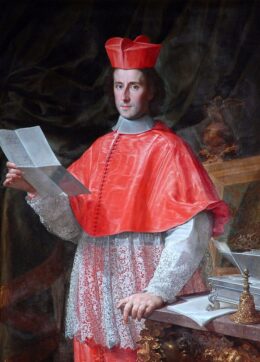
Printed
97 pages
Author(s)
Il Colombo
overo L'India scoperta
Il Colombo, ovvero L'India scoperta (Christopher Colombus, or India discovered) is performed in the same year and in the same place as Statira, which met with great success at the Teatro di Tordinona. The play is signed with the stage name Crateo Pradelini. Given in honour of princess Maria Ottoboni, it is performed on music by Bernardo Pasquini. The play draws inspiration from a scenic technique that was extremely successful earlier that year, when Gisueppe de Totis’ La Caduta del regno delle Amazzoni was staged. The prologue of his play showed the Earth divided into four continents; this spectacular performance was staged by Acciaiuoli. Giuseppe de Totis’ play seems to have inspired both Pasquini’s musical choices for the dance of the nations at the end of Act II and several dramatic elements such as Giumbè and Gelima’s comic contributions. To encourage people to attend Il Colombo, the Cardinal sets up a gondola service, allowing for people to avoid passing through streets infested with the plague. However, the play attracts little attention: its plot is deemed boring and implausible.
The libretto is not written for puppets specifically. However, a mechanic system in the play may be related to puppetry. The drama begins with Colombo (Columbus) on the sea, where he meets marvellous creatures—mermaids and tritons—which are taken up into clouds when Fortuna appears. At this moment, the theatre shows a vessel, then a lighter skiff. A dance of camels and monkeys is performed at the end of Act I. The second interlude shows a dance of European nations, dressed in identifiable costumes. Other moments are typical of baroque theatre, for instance when Colombo falls from the observation post from which he was spying on his wife, who was talking with the tyrant; or when Anarda and Colombo cross-dress to duel.
Two dressed up lovers duel
The play begins with Colombo (Colombus) sailing the sea with his wife Anarda and their son Fernando. They meet a choir of mermaids, then of tritons, all of which are taken away by Fortuna. The ship berths at Motenzuma, the capital of Peru. Tendilla, daughter of Ginacra, the king of Peru, advocates against welcoming the foreigners. Her lover Guascarre speaks against his wife’s empty fears. Ginacra sends him to the ships to meet the strangers, who have brought presents. When the Court and the strangers meet, Colombo fears that his wife Anarda will be tempted; she assures him that she is faithful. Their son falls in love with Tendilla. The servant Giumbè is leading two camels carrying many gifts. This is followed by a dance of monkeys trying to imitate human dances.
Ginacra wooes Anarda. As she rejects him, he tries to force Colombo to give his wife to him. The two husbands ask for Guascarre’s help, although he himself is jealous of Fernando. Taken to the temple to be sacrificed, Anarda accepts her coming death—to prove her love for Colombo. Trying to make her change her mind, Ginacra turns her into a goddess: faced with a renewed rejection, he takes her to prison. Colombo is set on dying for his wife. Fernando asks Tendilla to intercede with the tyrant on behalf of his mother. The interlude stages the European nations dressed in colourful costumes.
At night, Anarda is waiting in her cell for her husband to save her: Colombo arrives, carrying a torch, and with Giumbè’s help manages to see Anarda. Ginacra also arrives at the prison. Anarda pretends to like him and suggests that he kills Colombo in a duel, to win her love. Colombo hears the end of the conversation, displays jealousy and tries to kill himself at his wife’s feet. She prevents him from doing so and explains her plan to fight, disguised as him. Tendilla declares her love to Fernando: as a true gentleman, Guascarre promises his rival mutual love. Colombo cross-dresses and offers to fight the duel in Ginacra’s stead: the fight now opposes Anarda cross-dressed as Colombo, and Colombo cross-dressed as the king’s champion. Hurt by Anarda, Colombo falls to the ground; When she discovers her opponent’s true identity, she faints. Learning about Anarda’s feats, Ginacra decides to leave her alone. Tendilla hesitates between her two suitors: her father decides that she will marry Guascarre, the oldest of the two.
First performance
Teatro di Tordinona
Publications and translations
Il Colombo, ovvero L'India scoperta. Roma: Giovanni Francesco Buagni, 1690.
Nicola Badolato, "All'occhio, all'udito ed al pensiero", Gli allestimenti operistici romani di Filippo Juvarra per Pietro Ottoboni e Maria Casimira di Polonia. Torino: Fondazione 1563 per l’Arte e la Cultura della Compagnia di San Paolo, 2016.
